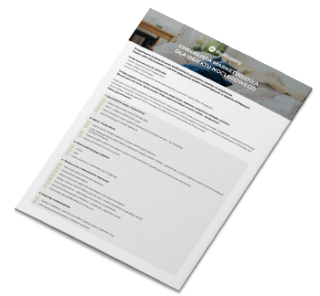
Secure Your Short-Term Rental Business: Proven Methods to Protect Against Losses and Damage
Short-term rentals can be very profitable, but they also come with the risk of losses and damage. To minimize this risk, property management must prioritize a few essential principles. The first of these, which we will discuss in this article, is the selection of suitable tenants. This process should involve several crucial steps: checking reviews and references, verifying identity, and implementing appropriate financial safeguards.
Tenant Selection: Checking Reviews, References, and Previous Rental History
The first step in the tenant selection process is thoroughly checking their reviews and references. This can be done by analyzing ratings and comments on short-term rental platforms such as Airbnb or Booking.com. Tenants with positive reviews from previous hosts are usually more trustworthy. It is also important to check references directly from previous landlords, if necessary and possible. Contacting previous hosts can provide valuable information about the tenant’s behavior, their responsibility, and how they cared for the rented property. If such history cannot be verified, the decision rests with the entrepreneur but always carries a risk.

Identity Verification: Using Tools Like Document Scanning and Checking Social Media Profiles
Identity verification is another crucial step to avoid issues related to fraud. Utilizing tools for scanning identity documents, such as ID cards or passports, helps ensure that the person booking the property is who they claim to be. It is also worth verifying the tenant by checking their social media profiles. Ensuring that the profile is active and appears authentic can provide additional information about the potential tenant. Some rental platforms also offer their identity verification systems, further increasing transaction security.
Financial Safeguards: Collecting Refundable Deposits and Reservation Fees to Protect Against Potential Losses
Another key element in safeguarding against losses is collecting a refundable deposit and reservation fees. A refundable deposit is a sum of money that the tenant pays before the start of the rental as security against potential damages or shortages. In the absence of issues, the deposit is returned to the tenant after the stay. Reservation fees can help protect the landlord against losses from last-minute cancellations. With these financial safeguards, the landlord can be confident that any repair costs or lost income will be covered.

Contracts and Regulations
Short-term rentals can be a significant source of income but also come with potential problems related to property damage or improper tenant behavior. To protect your business, draft regulations and ensure a detailed rental agreement.
Precise Rental Agreements A rental agreement is a fundamental document that regulates the relationship between the landlord and the tenant. Drafting detailed rental agreements is essential to prevent potential conflicts and clearly define the terms of responsibility. The agreement should include clauses regarding liability for damage and procedures in case of violations.
Important elements of the agreement include:
- Parties’ Details: Complete personal details of the landlord and tenant.
- Rental Period: Precise specification of the rental start and end dates.
- Rent and Fees: Rent amount, payment deadline, and any additional fees.
- Deposit: Deposit amount, payment conditions, and refund rules.
- Tenant Responsibilities: Detailed description of tenant responsibilities regarding property care, quiet hours, waste segregation, etc.
- Liability for Damages: Clauses specifying tenant liability for potential damages and repair or compensation procedures.
- Violation Procedures: Description of steps the landlord can take in case of agreement violations, including possible financial penalties or eviction procedures.
Property Use Regulations
Creating clear and understandable property use regulations is crucial to ensure tenants follow the rules. The regulations should be an annex to the rental agreement and precisely define the property use rules, prohibitions, and penalties for violations.
Important elements of the regulations include:
- General Rules: General rules regarding property use, including quiet hours, guest policies, smoking bans, and more.
- Safety: Rules for using electrical devices, fire safety, and maintaining security on the property.
- Cleanliness and Order: Requirements for maintaining cleanliness in the property, waste segregation, and cleaning procedures after the rental.
- Prohibitions: List of prohibited activities such as organizing parties, having pets (if not allowed), or making changes to the interior decor.
- Penalties: Description of financial penalties for non-compliance with the regulations, which may be deducted from the deposit or charged as additional fees.

Insurance
Purchasing appropriate property insurance is an essential element of protection against material losses and potential tenant claims. The insurance policy should cover various risks associated with short-term rentals.
Important aspects of insurance include:
- Property Protection: Insurance covering material losses caused by property damage, theft, or damages resulting from tenant actions.
- Liability Protection: Policy covering potential tenant claims related to bodily injury or property damage that may arise from property use.
- Financial Loss Protection: Insurance against losses from reservation cancellations, damages preventing further rental, or other unforeseen circumstances.
Monitoring
Installing monitoring systems such as security cameras and alarm systems is one of the most effective ways to protect the property. Security cameras can be placed in common areas such as entrances, corridors, or parking lots, in compliance with privacy protection laws. Video surveillance not only deters potential vandals but also allows for quick detection of unwanted incidents.
Alarm systems that respond to break-ins or smoke detection further enhance security levels. A well-configured alarm system can immediately notify the property owner or relevant services of a threat, allowing for prompt intervention.

Regular Inspections
Conducting regular property inspections is another key element of short-term rental management. Inspections should take place before and after each rental to assess the property’s technical condition and detect potential damages.
During inspections, attention should be paid to:
- Furniture and Equipment Condition: Checking that furniture and equipment are in good condition without visible damage.
- Installations and Devices: Inspecting the electrical, water, heating, and air conditioning systems.
- Cleanliness and Order: Assessing the property’s cleanliness, including bathrooms, kitchens, and common areas.
Regular inspections allow for the quick detection of problems and their immediate resolution, minimizing the risk of major failures and long-term losses.
Quick Response to Issues
Providing an efficient system for reporting issues and faults is crucial for maintaining high-quality services and tenant satisfaction. Tenants should have easy access to contact the property owner or manager in case of any problems.
Implementing a digital system for reporting faults, such as a mobile app or a dedicated website, enables quick and efficient communication of issues. It is important that reports are processed immediately and resolved as quickly as possible.
Quick response to issues such as equipment failures, furniture damage, or installation problems minimizes the risk of major damages and increases tenant satisfaction. Satisfied tenants are more likely to use the services again and leave positive reviews, attracting more customers.
The above eight points — from selecting the right tenants, drafting precise rental agreements, and clear property use regulations, to effective monitoring systems, regular inspections, and quick problem resolution — form the foundation for creating a safe and profitable rental model. Implementing these principles not only protects the property from damage but also builds trust among tenants, contributing to their loyalty and positive reviews. By adhering to these measures, property owners can enjoy peace of mind knowing their investment is well-protected and their business is yielding satisfactory returns.
Following these principles is key to effectively managing a short-term rental business, allowing for long-term success in a dynamically growing industry.
#ReadyForSuccess



